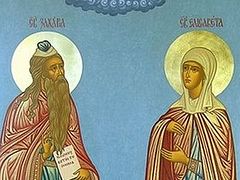Holy Righteous Zachariah and Elizabeth, whose memory we celebrate today, were the parents of St. John the Forerunner. Zachariah was a Jewish priest, and Elizabeth was the sister of Anna, the mother of the Most Holy Virgin Mary. They were righteous before God, but up to their old age they had no children and grieved greatly over this, because the Jews believed that whoever has no children, does not have God’s blessing. Finally the Lord heard their prayer. It was pleasing to Him to loose Elizabeth’s barrenness. According to the prophecy of the angel who appeared to Zachariah in the temple at the right side of the table of incense, Elizabeth gave birth to their son John, who was the Forerunner and Baptizer of the Lord. This is related in detail at the beginning of the Gospel of Luke. When Herod was murdering children in Bethlehem and its surrounding areas, St. Elizabeth and the baby John hid from the murderers in clefts of mountains, but Herod demanded of Zachariah that he hand over his son. Because Zachariah did not appease this insane and cruel demand, Herod ordered him killed between the temple and the altar. Soon after this, John’s mother, the holy Elizabeth, also died.
For the good of their children, parents are ready to sacrifice not only their property, but their health and even their lives. They have such strong love for their children, a love that is willing to make any sacrifice for the sake of their children’s temporal and eternal happiness. This is the parental love that we will talk about now.
Love is longsuffering, love is merciful, says the holy apostle Paul. And if any love is longsuffering or merciful it is parental love.
a) What won’t a father forgive his son? How grievously did Absalom offend his father David, having risen up against him with his rebellious subjects? But listen to what David said to his military commanders: “Do not harm my son Absalom” (cf. 2 Kings, 18:5). Truly, a parental embrace is not closed to prodigal children. What labors won’t a parent undertake for their children? What deprivations won’t they bear for their children?
b) There is no sacrifice that parents would not offer for their children; they will often deny themselves even the bare necessities, not eating or drinking, all so that their children would not go hungry. They will go barefoot and lack clothing so that their children would be clothed and shod.
We involuntarily recall the following from a touching story of one example of paternal love for children. On the dark day of the year 390 AD in the city of Thessalonica, at the orders of Emperor Theodosius to punish a rebellion, around 7000 people were killed in a circus without distinction as to whether they were guilty or not, citizens or foreigners. Stories about these killings abounded to the highest degree with touching incidents. One of these was especially long remembered: One misfortunate father took his two young sons to the circus that day. When the murderers reached him, he was able to touch their hearts and convince them to save the life of at least one of the two boys. But when he was ordered to choose between them, his heart betrayed him: He was unable to pick one of his own sons just to give the other over to death. They were both equally precious to him. So he gave both of them, along with himself, over to the brutal murderer’s sword.[1]
Oh! May the right hand of any son and daughter be forgotten if they forget the pains and labors, the care and love, the sleepless nights, the tireless labors of their parents.
c) But nowhere and with no such astounding power is parental love expressed as during a child’s illness. How much pain is heard in the father’s words: Lord, have mercy on my son: for he is lunatick, and sore vexed: for ofttimes he falleth into the fire, and oft into the water. And I brought him to thy disciples, and they could not cure him (Matt. 17:15–16). Or what a heart-rending cry tears from the soul of the Canaanite woman: “Have mercy on me O Son of David, for my daughter is sorely vexed!” The daughter is suffering, but even more is the mother suffering, and that is why she says, “Have mercy on me, Lord.” For parents there is no greater misfortune than their child’s illness. When their children are sick, nothing consoles them. The sun cannot brighten the darkened countenance of a father whose son is ill. He greets the day with tears, and with tears he sees it off. And who can describe the father’s joy when the merciful God hears his prayers and raises up his sick child?
d) It is hard for parents to bear their children’s physical pain, and true are the parental words: It would be better for me to be sick than my children. But moral sickness in children is incomparably worse. The former does not dishonor the parents, while the latter does. There is no greater shame for parents than to have morally corrupt children. An undisciplined child is a disgrace to his father (Sir. 22:3). A child left to himself causes shame to his mother (Prov. 29:15). Physical illnesses evoke sympathy for parents, and they hear comforting words all around. But bad people directly criticize the parents of such children. They say, “Well, those children of yours!” While although good people sympathize with the parents, they do not express their sympathy; because how could they? They can’t say, “What a pity it is that your children are so bad.” Wouldn’t that be hard to hear? And so the wretched parent hears no words of consolation from anywhere, nor does he dare to express his grief to others. He hides it in the depths of his heart, gives vows, calls upon the saints for help, and cries out to God: “Hear me, O Lord! Attend to the voice of my supplication.” But the problem is that physical illnesses are sometimes miraculously healed at the prayers and faith of those who pray. A child is dangerously ill; the doctors have given up and declare it terminal. But the prayer of faith saves the sick child and the Lord raises him from his bed of pain. And how often this does in fact happen! But not so for illnesses of the soul, for passions. Here healing depends on the grace of God, but equally on the will of the sufferer—on the free will of a human being that the Lord once gave, and does not wish to take away. If the wicked child does not want to correct himself, the parent’s prayers won’t help. Alas, some parents in their grieving souls often have to repeat the words of the wise son of Sirach: Weep for the dead, for he lacks light. Weep for a fool, for he lacks understanding. Weep more sweetly for the dead, because he has found rest, but the life of the fool is worse than death (Sir. 22:9–11).
My the Lord give understanding to children, that they would value their parents’ love; and may He save parents from the misfortune of having disobedient and corrupt children!
From: The Complete Yearly Cycle of Short Teachings, Composed for Every Day of the Year Applicable to the Lives of the Saints, Feasts, and Other Sacred Events Commemorated by the Church and Adapted for Lively Preaching (Improvisation), V. 2: Compiled According to the Best Homiletic Examples of Archpriest Gregory Dyachenko.





